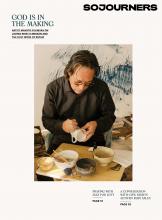WHEN I WAS in divinity school, we had cliques. And what often separated these cliques, these little theological gaggles, if you will, was what each prized as the decisive foundation of Christian faith. For some it was scripture; for others, orthodox or anti-orthodox tradition; for still others, charismatic revelation, or the experience of the marginalized, or some cocktail of all the aforementioned. Sometimes we said Christ united us, but then we’d wonder, with charity or suspicion, “Who is ‘Christ’ to them?” Isolated on our little islands of perpetual disagreement, we nonetheless seemed secure.
In After Whiteness: An Education in Belonging, Willie James Jennings has written a love letter to theological institutions, warning against the pursuit of such security. Our knowledge of ourselves, our God, and our world comes to us creatures only in fragments, he writes, and it is in those fragments that we must always work together. Jennings weaves story and poetry to expose how the allure of “white self-sufficient masculinity” has tempted Western educational institutions, especially theological ones, to use knowledge and people to establish control in the face of fragments. Theological education may initially crack the foundations of budding ministers, but it often aims to form self-confident possessors of particular truths. This vision proceeds from whiteness, what Jennings calls “a way of being in the world that aspires to exhibit possession, mastery, and control of knowledge first, and of one’s self second, and if possible of one’s world.” Such whiteness “strangles,” he writes, “the possibilities of dense life together” for Christians.
Read the Full Article

